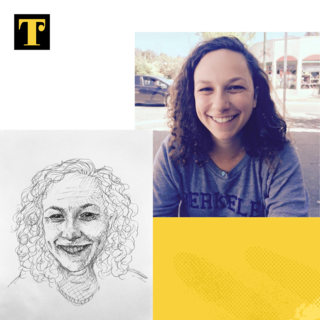Relationships
How to Be In Love With Your Future Self
If you want to look forward to your future self, start imagining her now.
Posted October 21, 2019 Reviewed by Lybi Ma

I asked my 26-year-old niece Mia to tell me about her future self. Who does she envision she will be at 55? She said this wasn’t something she had considered. She was busy worrying about 30. But what if, I asked, you could imagine yourself beyond 50? How would that make you feel now?
Mia at 55:
She directs or runs a community project. She is confident in her competence and abilities. She is kind and empathetic yet firm and stalwart.
I also asked my colleague Britton, a woman in her 30s, to imagine herself at age 70. What would she be like?
Britton at 70:
This is me at 70
Rooted like a tree
Thick trunk solid and strong
Bones rugged as the day is long
Every inch of myself I hold with pride
I’ve unlearned the lie that I should hide
My friend Nell is in her late 40s. She envisions her future self as well.
Nell at 60:
My future self is handsome, sexy with graying hair and a calmer presence. I see myself both slowing down, but not giving up, just taking more time to take things in.
How do you feel about your future self? Do you look forward to becoming her?
Have you thought about who you want to be at 50? How about 70, or even 100?
What if aging could be more than something that just happens to us? What if growing older as a woman is an endeavor that we have some say in crafting?
Britton at 70:
I make time to bathe under the sky so blue
And celebrate my beautiful dark brown hue
My wrinkles and grays I wear with esteem
They hold my stories, adventures, fears, and dreams
My branches are many like the paths I have taken
They may sway with the wind but they remain unshaken
Our aging selves are a creative prospect.
It seems we are hard-wired as prospectors of the future. We actually possess a neurological talent that sets us apart from other species. We have the ability to imagine what does not yet exist. Our imaginations lead to understanding new possibilities, and these new possibilities become the innovation of things, culture, and identities.
Psychologist Martin Seligman suggests that instead of homo sapiens, we should be named homo prospectus. He cites research that confirms that, even when at rest, the brain wanders by default to imagining the future. Perhaps, Seligman wonders, instead of being driven by the past, we are actually drawn into the future.
Doesn’t it make sense to give our evolving selves attention, curiosity, and love?
Mia at 55:
She creates a space of kindness in which younger people can feel safe to grow and develop. She is generous with her care, knowledge, and passion. She gives her time but still keeps enough for herself.
E. Paul Torrance published a 22-year study in which he followed a group of children into adulthood. The participants who as children reported being in love with their imagined future selves became adults who reported more life satisfaction. They also scored higher on tests measuring creativity and academic achievement.
Psychologist and marketing professor Hal Hershfield and his colleagues at UCLA Anderson researched the many benefits of envisioning the future self. Individuals who consciously consider their future selves take better care of their present selves as measured by studies looking at how they save money, eat healthily, and exercise.
Increasing our future self-continuity even impacts how we behave ethically in the here and now.
I wonder, what would I do differently now, if I am intentional about my self at age 80?
I would do yoga every day. And meditate. I would start to cultivate the inner resources that will make me fierce and wise as my 80-year-old self. I would take more time to listen and be present with others.
Me at 80:
My 80-year-old self has an interior that goes beyond the daily material world. She can be still. She can listen. She can hold the paradox of life and death, good and bad, young and old.
Thinking about my future self gives me joy. I look forward to being her. She is important to me. By envisioning her I am eager to step onto the path of her becoming now.
Nell at 60:
Every cell of my body is liberated, I am vibrantly alive. I am free of anxiety and depression. The days that I feel damaged fade into a quiet acceptance. I playfully face the less preferred parts of being human.
It is ageism that interferes with our delighting in future self-prospection. Ageism is stereotyping, and it limits our vision.
Mary Pipher, in Women Rowing North, calls ageism “a prejudice against one’s own future self.”
When we are prejudiced towards our future selves, we are not seeing who they really could be. And we are not imagining who else they could be.
It is not easy to overcome the bias of the ageist code. Most of the time we don’t even realize we have it.
Researcher Becca Levy of Yale University warns that the aging bias is implicit. It operates outside of our awareness, and instead, insidiously informs the choices we make, the way we function, and who we become.
Mia at 55:
She is proud of her life and her actions. She has a community that supports her and to which she offers support. She is surrounded by love and gives it freely. There are flowers and sun where she works
Author and activist Ashton Applewhite calls for a cultural shift in our aging consciousness. She proclaims: “Aging is life itself, which is what makes it so damn interesting,” and suggests that we think of ourselves as “an old person in training.”
Applewhite says:
Becoming an old person in training is a political act because it derails shame and self-loathing. It undoes the “otherness” that powers ageism.
Being an old person in training could free up our creative future self-prospecting. Our aging person in training can be someone to look forward to, instead of something to dread.
Nell at 60:
I will still have passion and lust, and maybe do something outrageous. Something I never did before but secretly always wanted to. I’ll speak my truth more openly, less defensively. I imagine myself growing more and more into freedom.
Allure magazine no longer uses anti-aging language. Others in the beauty industry are following this track. We can’t actually anti-age. Clinging to youth prevents us from growing into someone else. If we anti-age, we stagnate our becoming.
Anti-aging doesn’t stop us from aging, it just interferes with our imagining.
And then we become someone else’s design.
Nell at 60:
I want to grow into the parts of myself that feel broken and have my life blossom into a place that I feel safe to love and grieve, dance and cry.
Future self-prospecting is a collaborative project. Our futures are culturally constructed. We build upon that which was, is and could be, collectively. We never start from scratch. And none of our identities were built upon a solitary imagination. We all have a part to play in the unfolding of what’s next.
Britton at 55:
My leaves come and go as things in life will
But memories are held close, quiet and still
I am wild and unafraid, always charting new ground
Unbothered and unstoppable by the obstacles all around
I have endured many seasons yet I stand strong and tall
Feisty, fierce, phenomenal woman and I embrace it all.
Longevity is a gift that was imagined by many before us. Let’s give it more curiosity and less stereotyping. Let’s take ownership of our futures so that we are drawn forward instead of held back.
Mia at 55:
She celebrates life and has lived. She has joy and she knows pain but has learned how to cope with it, and she trusts herself to overcome obstacles.
To all future selves yet to be realized, we eagerly anticipate your unfolding.
References
Thank you to Mia Szarvas, Britton Williams and Nell Wise. I have enjoyed and look forward to their future selves.
Seligman, M. E., Railton, P., Baumeister, R. F., & Sripada, C. (2016). Homo prospectus. New York, NY, US: Oxford University Press.
Levy, B. R., & Banaji, M. R. (2002). Implicit ageism. In T. D. Nelson (Ed.), Ageism: Stereotyping and prejudice against older persons (pp. 49-75). Cambridge, MA, US: The MIT Press.
Applewhite, Ashton.(2019). This Chair Rocks: A Manifesto Against Ageism. Celadon Books
Rutchick, A. M., Slepian, M. L., Reyes, M. O., Pleskus, L. N., & Hershfield, H. E. (2018). Future self-continuity is associated with improved health and increases exercise behavior. Journal of Experimental Psychology: Applied, 24(1).
Jean-Louis van Gelder, Hal E. Hershfield, and Loran F. Nordgren. (2013) Vividness of Future Self Predicts Delinquency. Psychological Science.




